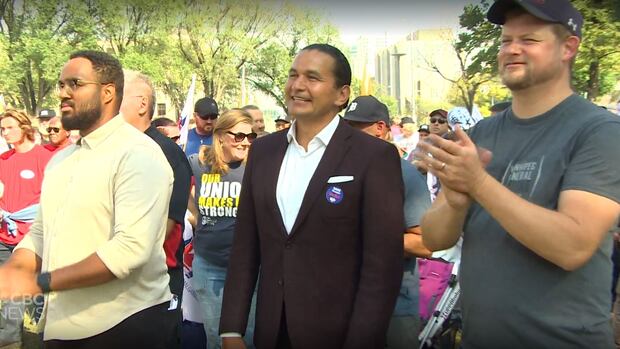After 1 year as Manitoba premier, Wab Kinew remains popular despite limited progress on biggest issues
One year after taking office, Manitoba Premier Wab Kinew is intent on telling voters his NDP government’s issues are the fault of the PC administration his party ousted, while maintaining he’ll make inroads on monumental challenges facing the province, such as fixing the health-care system, addressing homelessness and balancing the budget.
In a sit-down interview Wednesday to mark a year in power, Kinew relied on his usual talking points, as he said fixing the damage the former Progressive Conservative government brought to health care, such as the decision to convert three Winnipeg emergency departments into urgent-care centres, would take years.
“The scale of the health-care challenge is so large” that even though the government is on track to deliver its promise of hiring 1,000 net new front-line workers this year, “we now gotta repeat that again next year and then the year after,” the premier said
Kinew also blamed the Tories for complicating the government’s efforts to balance the budget by contributing to a deficit approaching $2 billion in the last fiscal year.
“It’s a much narrower path to balance, but I think the way that we get there is the same way that the average family figures out how do you balance your family budget,” he said.
“What’s important to us and how can we do some belt-tightening that preserves those priorities?”
ER wait times worse, tax cuts deeper
But after one year, his government’s progress on some of Manitoba’s biggest challenges is limited.
Emergency room wait times in Winnipeg are worse year-over-year than under the PCs and, despite lamenting the province’s fiscal situation, he has willingly surrendered hundreds of millions in tax revenue by eliminating the gas tax for 2024.
Despite these contradictions, a Manitoba political expert said Kinew is enjoying “rather spectacular popularity” that, according to one recent poll from Probe Research, is growing across the province.
“All parties are entitled to a certain duration of a honeymoon, but this seems to be beyond what most parties would get, even during 12 months,” said Paul Thomas, a professor emeritus of political studies at the University of Manitoba.
“I think a lot of that, probably most of it, is based on the performance of the premier, who is not only the greatest strength of the government — he’s also the face of the government in every event, opportunity that comes along.”
WATCH | Kinew proud of Manitobans for uniting after bitter election campaign:
One year into his mandate, Manitoba Premier Wab Kinew says one of the things he’s most proud of is how many people seem to have rallied around his NDP government, putting the divisive rhetoric of last year’s campaign behind them.
A former broadcaster and public speaker, Kinew is a superb communicator who seems to thrive speaking at any event, Thomas said.
“His capacity to find just the right phrase for a particular occasion is something instinctive.”
He said the premier’s fortunes have been emboldened by people’s willingness to grant the new government some slack, despite significant challenges in health care, crime and reconciliation, among others, that cannot be solved overnight
“There seems to be some grace period being granted by Manitobans that the government’s entitled to more time to demonstrate results.”
Premier warned it would take time
Thomas also points out Kinew has long warned that fixing the major issues would take years, if not longer.
“But I’m not sure that people heard that caveat,” he said.
“What they heard was that there would be shorter wait times for various medical procedures. They heard that we would have fewer encampments and fewer people beset by drugs, fentanyl, and committing crimes to deal with their drug habit.”
Kinew made history on Oct. 3, 2023, when the son of an Anishinaabe chief became the first First Nations premier of any Canadian province.
His New Democrats won 34 of the legislature’s 57 seats, dethroning the Progressive Conservative Party that was in power for seven years. The NDP has added a 35th MLA after winning a byelection in the Tuxedo constituency in June.
Throughout the election campaign, the NDP strived to make health care the top issue for voters.
A year later, staff are still overworked and people are still waiting years for surgeries and hours in waiting rooms.
On Wednesday, Kinew continued to point the blame entirely at his predecessors.
“It will take us years to fix the damage that Heather Stefanson and Brian Pallister caused in health care,” he said, referring to the two previous PC premiers.
The premier said the hiring of 873 net new health-care workers shows the government is making progress, but still, some unions say front-line workers haven’t noticed any change.

In order to balance the budget, Thomas said the government must start curtailing spending and saying no to groups asking for money.
“When you raise concerns or express needs or make demands on this government, it seems very, very willing and inclined to please,” he said.
NDP plans to curtail spending
The NDP’s plan to balance the budget by 2027 forecasts annual spending growth in future years will be less than 2.5 per cent — well below the six per cent spending increase in this year’s budget.
Achieving that goal will be “very challenging,” Thomas said.
“It will require some good luck in terms of economic growth and prosperity and revenues and sustained federal transfer payments, in particular.”
WATCH | Gas tax holiday ‘temporary,’ but premier won’t say when levy returns:
Premier Wab Kinew says giving Manitobans a break from the provincial gas tax was his NDP government’s ‘big, marquee’ commitment over his first year in office. But with a ballooning deficit, he stresses it’s only a temporary measure that may or may not continue in January.
Kinew has recently warned that fiscal restraint is coming.
“One of the problems may be that they’re leaving these hard choices deeper into their four-year term in office,” he said.
“That’s the last point at which you want to be telling people the unfortunate news that we’re going to have to raise taxes because we didn’t control our spending in the prior years.”
Progressive Conservative interim leader Wayne Ewasko expects the premier’s popularity to slump as more Manitobans recognize their province is struggling under Kinew’s leadership.
“People are starting to realize, hey, their wait times have not gotten any better in health care, their schools aren’t getting built,” he said, citing the NDP pausing the planned construction of nine schools.
“When we talk about Hydro, when we talk about finances, there doesn’t seem to be any plans. It’s all about short-term gains and very small gains at that.”






